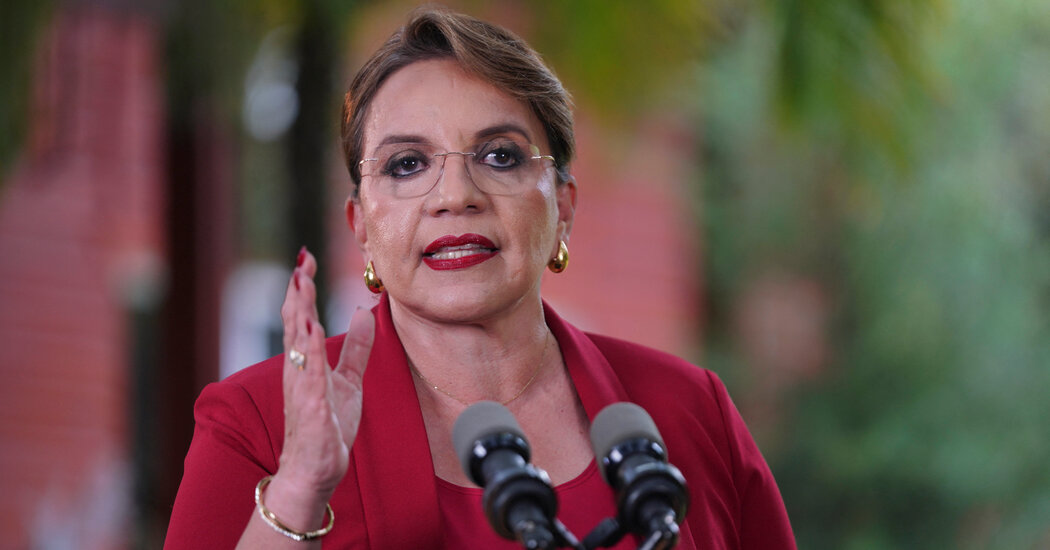Breaking News
Honduran Leader Threatens to Push U.S. Military Out of Base if Trump Orders Mass Deportations

Honduras’s president has threatened to push the U.S. military out of a base it constructed decades ago in the Central American country if President-elect Donald J. Trump proceeds with mass deportations of undocumented immigrants from the United States.
President Xiomara Castro of Honduras made this statement in a televised address on Wednesday, marking the first significant opposition by a regional leader to Mr. Trump’s plan to repatriate millions of Latin American citizens residing in the United States.
The warning came as foreign ministers were scheduled to convene later in the month to discuss the deportation issue.
“Faced with a hostile attitude of mass expulsion of our brothers, we would have to consider a change in our policies of cooperation with the United States, especially in the military arena,” Ms. Castro stated regarding Honduras.
“Without paying a cent for decades,” she added, “they maintain military bases in our territory, which in this case would lose all reason to exist in Honduras.”
Honduras’ foreign minister, Enrique Reina, mentioned in a radio interview following the president’s address that Honduras’s leader had the authority to unilaterally suspend a long-standing agreement with the United States, which permitted the construction of the Soto Cano air base and the operation of America’s largest military task force in Central America from that location.
This move would pose significant risks for the small country, heavily reliant on the United States as its primary trading partner and a source of humanitarian aid.
Will Freeman, a Latin America studies fellow at the Council on Foreign Relations in New York, expressed surprise at the Honduran president’s bold statement: “I’m surprised a bit by the boldness of it.”
In response to Ms. Castro’s warning, a spokesman for the Trump transition team, Brian Hughes, stated, “The Trump administration looks forward to engaging our Latin American partners to ensure our southern border is secure and illegal immigrants can be returned to their country of origin.”
While Mr. Trump pledged swift deportations of undocumented immigrants upon taking office, his transition team has not disclosed concrete plans, leaving Latin American governments uncertain as they try to prepare. Mr. Trump also vowed to impose a 25 percent tariff on Mexico and Canada if they did not halt the influx of migrants and fentanyl into the United States.
Most Latin American governments, including Mexico’s, have worked to maintain positive relations with Mr. Trump, emphasizing the contributions their citizens make to the American economy, regardless of their legal status.
This week, Mexico’s president, Claudia Sheinbaum, reiterated: “We will continue to demonstrate how the Mexican people in the U.S. contribute in a very important way to the U.S. economy. And if Mexican people were not in the U.S., there would be no food on American tables.”
Governments have also reassured their citizens in the U.S. by preparing for potential large-scale expulsions. Honduras plans to establish mobile consulates, while Mexico created an online application for its citizens to alert consulate authorities if they face imminent risk of detention.
In a shift from her previous stance of seeking a deal with Mr. Trump to avoid receiving such migrants, Ms. Sheinbaum of Mexico suggested on Friday that Mexico might accept deportees from other countries, though she reiterated her administration’s disagreement with mass deportations.
“We are going to ask the United States that, as far as possible, migrants who are not from Mexico can be taken to their countries of origin. And if not, we can collaborate through different mechanisms,” Ms. Sheinbaum stated.
“There will be a time to talk with the U.S. government if these deportations really occur,” she added. “But here we are going to receive them; we are going to receive them well, and we have a plan.”
Governments in the region heavily rely on remittances from immigrants in the United States, which account for up to 25 percent of Honduras’s economy. Approximately half a million undocumented Hondurans, around 5 percent of the population, were estimated to be living in the U.S. in 2022, according to the Pew Research Center.
Since the 1980s, an American task force has been operating out of Soto Cano, an air base owned by the Honduran government in Comayagua, located about 50 miles from the capital, Tegucigalpa. Initially built by the United States in the 1980s to combat what it perceived as the Communist threat in the region.
Currently, Soto Cano hosts over a thousand American military and civilian personnel, as stated by a spokeswoman for the task force stationed there, Joint Task Force Bravo, on Friday.
“We are guests of the Honduran government on a Honduran base,” confirmed the spokeswoman, Capt. Hillary Gibson.
While the task force has been involved in counternarcotics operations, Captain Gibson highlighted its recent focus on disaster relief and delivering humanitarian aid.
The U.S. Embassy in Honduras did not provide an immediate response to a request for comment.
The U.S. military maintains a presence at bases in other countries in the region, including El Salvador, albeit with fewer U.S. military personnel than Soto Cano.
While many Hondurans welcomed Ms. Castro’s statements, some elected officials sought to distance themselves from the president. Several members of Congress emphasized the need for dialogue with the Trump administration and noted that removing the U.S. military from the base would not prevent Mr. Trump from executing mass deportations.
Mr. Reina, the foreign minister, stated on Thursday that Honduras aimed to maintain good relations with the United States. Nevertheless, he stood by the president’s remarks, asserting that if mass deportations violating migrants’ rights were implemented, the country’s leaders had the “right to reconsider” its relationship with the United States.
Mr. Reina also announced on social media that the leaders of Honduras and Mexico had convened the foreign ministers’ meeting to address mass deportations. The post was accompanied by a photo of Ms. Castro holding hands with Ms. Sheinbaum.
Mr. Freeman, the Latin America studies fellow at the Council on Foreign Relations, expressed surprise at the Honduran government’s stance, as while Ms. Castro had publicly taken a confrontational approach to the United States recently, including moving to terminate a longstanding extradition treaty, she had been known to maintain a more amicable relationship with the U.S. ambassador behind closed doors, seeking continued American support.
He also found it surprising that Ms. Castro would issue such a warning prior to Mr. Trump assuming office, particularly in light of statements from Mr. Trump’s choice for secretary of state, Marco Rubio, the Republican senator from Florida.
Mr. Rubio had cautioned that under Ms. Castro’s government, Honduras could potentially become “the next Venezuela,” where an escalating crisis under the authoritarian rule of Nicolás Maduro has led to mass emigration.
“I think it will sour the relationship, which would have already been sour, with the Trump administration,” Mr. Freeman remarked. “And I don’t see these northern Central American countries are in a position to leverage much with the U.S. over the shape of migration policy.”
“Now Mexico,” he added, “is a totally different story.”
The United States does not have full diplomatic relations with some countries in the region, including Venezuela and Cuba, which have faced severe U.S. sanctions. Consequently, these nations are unlikely to accept a large number of deportation flights.
Emiliano Rodríguez Mega contributed reporting.
-

 Destination7 months ago
Destination7 months agoSingapore Airlines CEO set to join board of Air India, BA News, BA
-

 Breaking News8 months ago
Breaking News8 months agoCroatia to reintroduce compulsory military draft as regional tensions soar
-

 Tech News11 months ago
Tech News11 months agoBangladeshi police agents accused of selling citizens’ personal information on Telegram
-

 Breaking News8 months ago
Breaking News8 months agoBangladesh crisis: Refaat Ahmed sworn in as Bangladesh’s new chief justice
-

 Guides & Tips9 months ago
Guides & Tips9 months agoHave Unlimited Korean Food at MANY Unlimited Topokki!
-

 Gaming8 months ago
Gaming8 months agoThe Criterion Collection announces November 2024 releases, Seven Samurai 4K and more
-

 Toys10 months ago
Toys10 months ago15 of the Best Trike & Tricycles Mums Recommend
-

 Tech News9 months ago
Tech News9 months agoSoccer team’s drone at center of Paris Olympics spying scandal
























